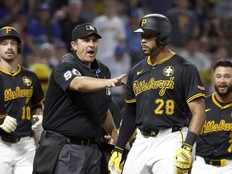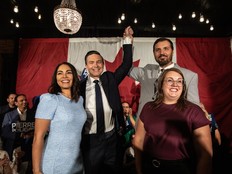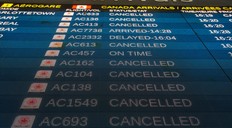B.C. premier Eby says more counter-tariffs won’t change Trump’s mind

Article content
British Columbia’s premier warned that more Canadian counter-tariffs on the U.S. might inflict “severe harm” on his province, while failing to deter President Donald Trump from pursuing his trade war.
David Eby has been an outspoken proponent of boycotting the U.S. and has retaliated in response to Trump’s import taxes. His government pulled U.S. wine and liquor from store shelves and proposed a law to charge new fees to Alaska-bound truckers passing through the province.
But so far, Canada’s retaliatory tariffs on U.S. products “haven’t seemed to have had the kind of impact that we would hope for,” and they disproportionately hurt B.C. companies and workers, Eby said in an interview with Bloomberg News.
That’s because the west-coast province has difficulty replacing certain American products. It’s thousands of miles away by rail from Canada’s manufacturing heartlands in Quebec and Ontario, so importing heavy commodities like steel from the U.S. can still be cheaper.
“I don’t think that additional counter-tariffs are going to change Donald Trump’s mind,” Eby said.
Eby’s comments reflect a further splintering of views among Canadian policymakers about the best way to respond to U.S. protectionism. They also come against a backdrop of a slowing Canadian economy and a trend of rising unemployment.
When Trump launched his trade war in January and Justin Trudeau was still prime minister, Canada’s approach was to swiftly respond to any new U.S. tariffs with its own. As a result, there are 25% tariffs on tens of billions of dollars of U.S.-made consumer and food items, as well as steel and aluminum products. Ontario Premier Doug Ford also favours a “dollar for dollar” tariff retaliation policy.
But new Prime Minister Mark Carney has taken a different path, trying to balance the political imperative to retaliate with the potential economic harm of driving up costs for consumers and businesses. He has carved out a number of exemptions to the counter-tariffs.
B.C. has an unemployment rate of 5.6%, below the national rate of 6.9%
Eby predicted that tariff pain “is going to start to show up in a significant way in the United States soon” and that “will ultimately be what helps drive reform” as companies deplete the pre-tariff stockpiles they’ve hoarded.
“It’s going to be a longer fight than any of us wanted.”
Eby has been meeting the prime minister and Canada’s other premiers in Ontario this week. The discussions have been in part to try to accelerate big construction projects to boost the economy, helping to offset tariffs.
But before those meetings, he complained the federal government risks neglecting opportunities in B.C. in favour of what he suggested is an expensive distraction: a new oil pipeline running from Alberta to British Columbia’s coast, allowing more crude exports to Asia. Alberta Premier Danielle Smith and some other premiers are in favour.
“What is the opportunity cost?” Eby asked, arguing it would take at least five years and possibly $50 billion in federal funds to get such a conduit built, along with a proposed carbon capture and storage project. Many Indigenous people in B.C. who would be affected by the pipeline are “underwhelmed” by the idea, he said.
Canadian Energy Minister Tim Hodgson recently visited Alberta to discuss the potential for a pipeline. B.C.’s energy minister traveled to Alberta to pitch Hodgson for federal help on the multibillion dollar North Coast Transmission Line, which would hook up mines, ports and liquefied natural gas projects to the province’s electrical grid.
“To be blunt, it’s like it’s the first time the federal government’s heard about it,” Eby said. “It’s just not acceptable.”
While the premier is skeptical about another oil pipeline to the B.C. coast, he hasn’t explicitly said he will fight such a proposal. Whenever he’s asked, he says there’s no project currently on the table to debate.
Eby leads the province’s left-leaning New Democratic Party and was reelected with a narrow majority in October. He came to power in 2022 saying B.C. cannot expand fossil-fuel infrastructure and hit its climate goals. Now, he’s celebrating the blossoming of a new LNG industry on BC’s coast.
“We’re quite excited” about the increased revenue and jobs that would come from doubling the size of LNG Canada, one of the country’s largest-ever private investments.
The first phase of LNG Canada, which is backed by global energy giants including Shell Plc and PetroChina Co., began making shipments of Asia-bound gas about three weeks ago. Once it reaches full capacity, this phase alone would turn Canada into the eighth-largest LNG exporter globally, based on 2024 figures compiled by Bloomberg.
For Canada, phase two would further diversify exports away from the U.S. and toward Asia, where leaders want Canadian gas because it’s a stable supply and “the lowest carbon in the world,” Eby said.
On his change in tone about fossil fuels, Eby said: “Many of the opportunities that we saw coming as a result of a global realignment are further off than we hoped.”
“In terms of where we should be heading on climate, it’s not ideal — but it’s also a moment that calls for some real pragmatism,” he added, pointing to B.C. priorities like cutting methane emissions, electrifying machinery where possible, and partnering with Indigenous people.
“The question for us is: how do we continue to drive our core beliefs around ensuring a low-carbon future, while recognizing the reality that British Columbians need to work, need revenue to run the government?”














Postmedia is committed to maintaining a lively but civil forum for discussion. Please keep comments relevant and respectful. Comments may take up to an hour to appear on the site. You will receive an email if there is a reply to your comment, an update to a thread you follow or if a user you follow comments. Visit our Community Guidelines for more information.